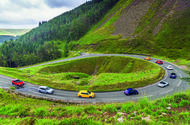One of these sporty daily drivers will win our testers’ highly prized ‘Golden Biscuit’
Nine enthusiast’s cars but just one can win our annual contest – and only after a day’s hard driving in the Welsh mountains and another on track
Spend a little, get a lot: that’s the spirit in which Autocar’s annual Britain’s Best Affordable Driver’s Car competition is convened – and it has yet to fail to produce an engaging contest or to address the appetite-whetting relevance needed to make for essential reading on any of the previous occasions we’ve run it since the turn of the decade.
This year, BBADC majors on variety. It brings together examples of go-faster fun from purveyors of the stuff as alphabetically distant as Abarth is from Volkswagen. It includes performance-tuned takes on the supermini, city car, estate car and four-door fastback GT, as well as several full-sized hot hatchbacks – and one classic sports car appearing in none other than its 30th anniversary year. Front-driven, rear-driven and all-wheel-driven options are included and any can be yours for less than the price of a mid-range executive saloon car: £35,000 and downwards, or thereabouts.
Part 2: Deciding an all-out winner
Yup, this year’s is a varied bunch – and identifying the most dependable source within it of small-budget at-the-wheel fun ought to tell us plenty besides, not least about the state of the enthusiast car in 2019. So with daily usability and performance value front of mind and a day each of fast road and track driving to help them decide, it’s over to our judges to elect this year’s best affordable thrill-drive.
Meet the judges
Matt Prior, editor-at-large

Brought a familiar blend of enthusiasm and focus to the judging panel. Also remembered to bring crucial mobile phone charging accessories. A real pro.
Mauro Calo, special correspondent
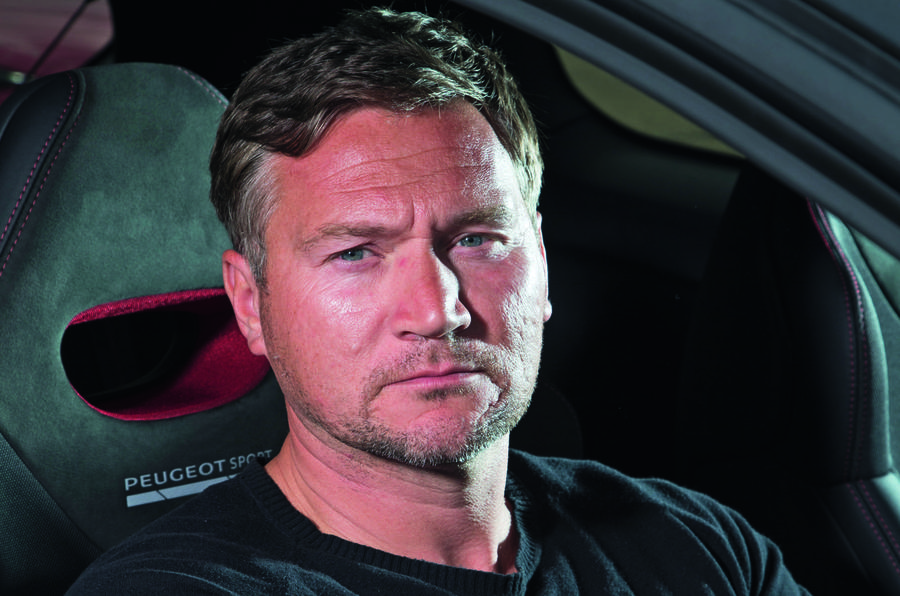
Has seen more Autocar group test action than some of our older photography equipment so high time he had a vote in one. Sense of humour and taste in footwear equally loud.
Richard Lane, road tester

Your guide to the test’s opening exchanges was prevailed upon to pay slightly less attention to his racing lines and more to everyone else’s comments – and did so very attentively.
Simon Davis, road tester
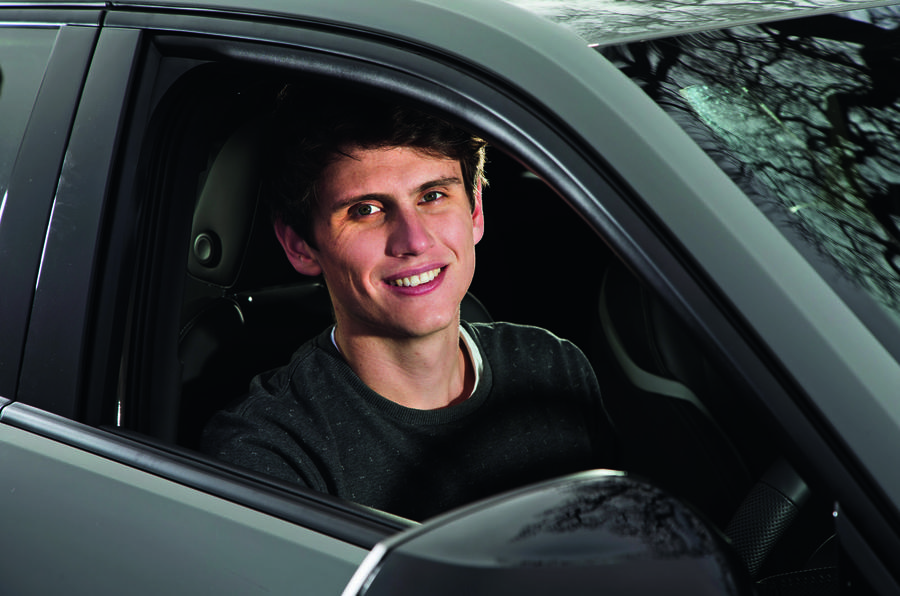
A first-timer at Llandow, but his steely determination and commitment didn’t let it show. Knew what he liked – both in the paddock and at the breakfast buffet.
Matt Saunders, road test editor
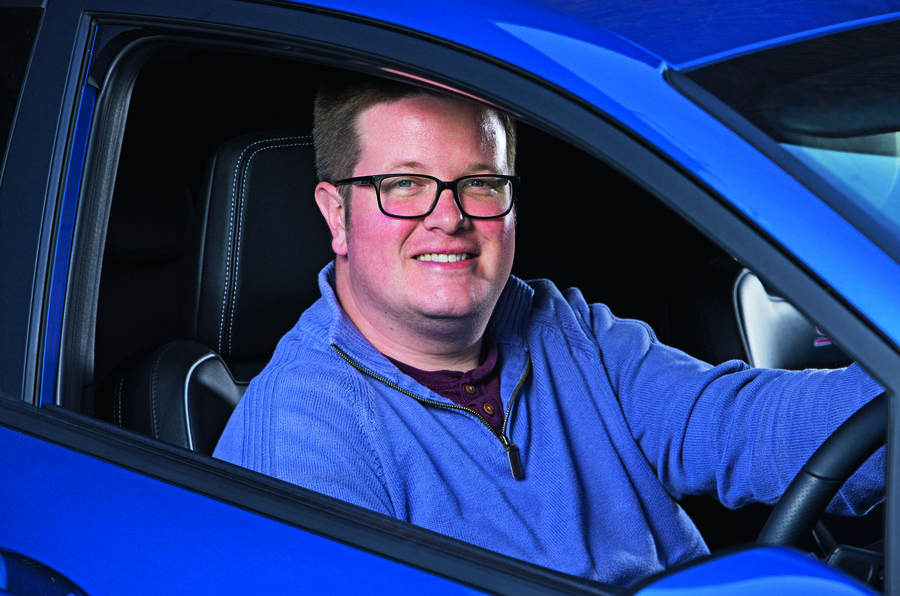
Performed at an imposingly high level right until realising he’d booked the track on the wrong day. Redeemed by being fastest to phone the nearest Kwik Fit when it was required.
Meet the contenders
Is this the missing piece of the puzzle? Grunting up the dark granite terraces of the Rhondda, our Orange Fury Focus ST looks more like a fragment of pop-art jigsaw that’s made its way into the Rembrandt box, but with its glue seams still warm from the assembly line in Saarlouis, it’s the car that simply had to be here.
I’ve driven the Ford over to Wales from our road test base in south-west London, and even blindfolded – inadvisable in any car, not least one that makes 276bhp from an upscaled 2.3-litre engine derived from the old Focus RS and equipped with anti-lag, no less – straight away you’d know you were sitting in a contemporary fast Ford. Heavily bolstered Recaro seats, hair-trigger steering response, plenty of piped-in exhaust sound: so far, so predictable. But this all-new Focus ST also gets an electronically controlled limited-slip differential that can send up to 50% of torque to whichever front Michelin Pilot Sport 4S stands to benefit most.
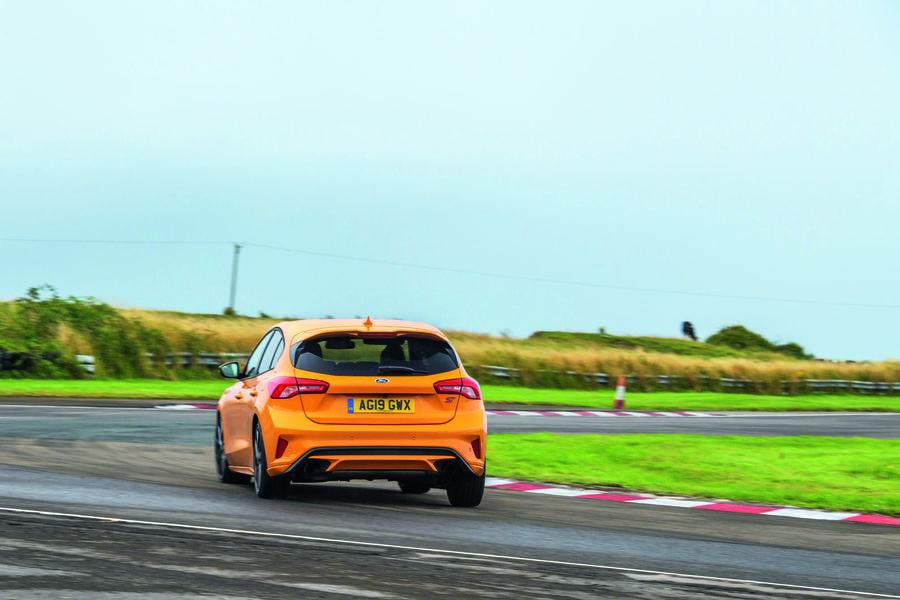
Even on the roundabouts leading up to our rendezvous high in the terrain farther along our route, it’s generating an electronics-aided level of pace that feels as though it might just see off a Ford GT – y’know, the homologation special Ford built to win at Le Mans.
Later that day, up on the mountain, it prompts encouraging words such as ‘involvement’, ‘feedback’, ‘playful’ and ‘mischievous’ from the judges of this contest, known informally as Junior Handling Day. The Ford is well liked, although in the past that’s never alone been enough to secure a win in this contest – or even passage through to the final shootout.
Another mischievous car, albeit one that won’t make it through, is Abarth’s refreshed 595 Competizione. With aubergine paint and an exhaust system that sounds as though it’s attached not to a 177bhp 1.4-litre four but a Maserati V8 that’s down a bank of cylinders, this is a difficult car to dislike but one that’s impossible to love.
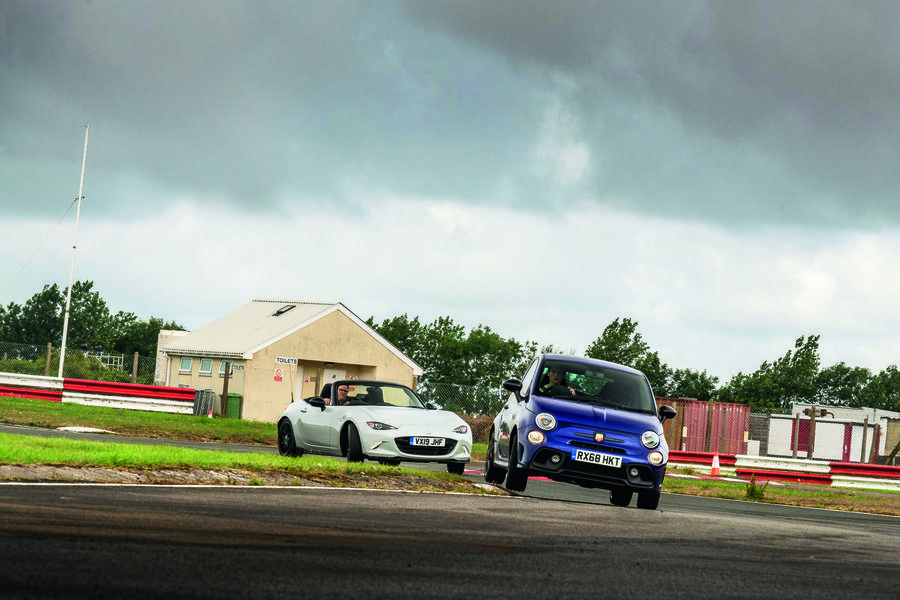
Not even Alcantara-trimmed Sabelt bucket seats, Koni FSD dampers and Brembo brakes can change that. “It’s so far adrift of the rest of the field objectively that it’s hard to take seriously,” says road test editor Saunders. Tomorrow at Llandow Circuit, he’ll describe the Abarth as “amusingly out of its depth although still engaging to hustle” and “every bit as quick as you’d want it to be”. It’s a view shared by most here: the ride is too lively, the driving position more bus driver than race driver and – final nail incoming – it’s more expensive but less practical than last year’s Junior Handling Day winner, the Ford Fiesta ST.
Is there any more to the Abarth? I think so, but maybe I’m a softer soul than my colleagues. Either way, despite the indirect steering and hopeless pedal positioning, it’s already my guilty pleasure of this test. You can’t entirely disable the electronic stability control, presumably because something with such high grip levels (it’s wearing Pirelli P Zero tyres), narrow tracks and a tiny wheelbase can quickly snap round on itself, but it’ll still play all right. You might not notice it on the road because the dampers seem to hit bedrock out of nowhere and the ride therefore becomes unpredictable too often, but through quicker corners on track, the little Abarth adopts a slither of yaw on a trailing brake and then develops heroic traction thanks to the limited-slip differential. Ultimately, it’s fast but flawed and, as road tester Davis dryly opines, best experienced in small doses.
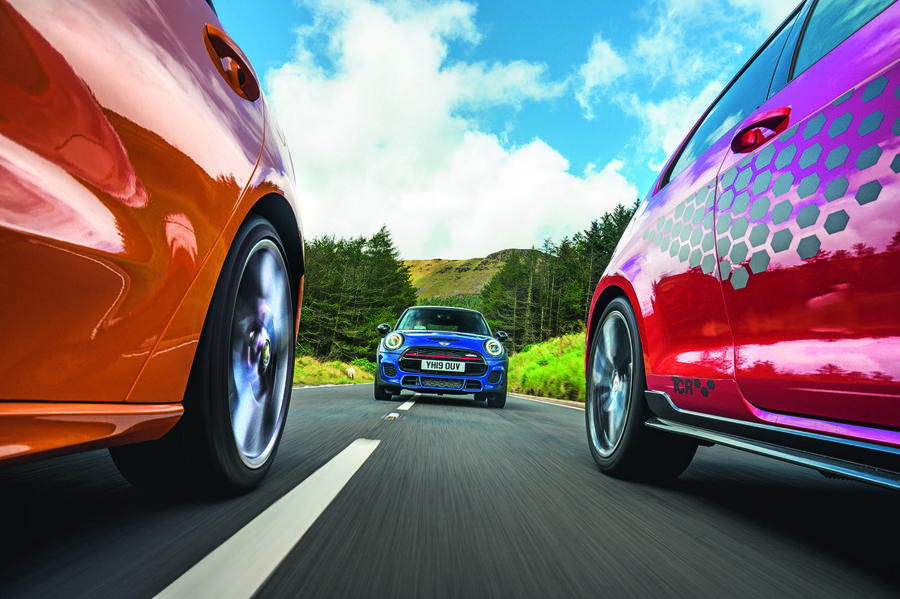
Among the list of contestants at Junior Handling Day 2019, it’s impossible to consider the Abarth without also contemplating its closest rival in terms of size, power and layout. So would we take the latest Mini John Cooper Works over the Italian? We’ll get to that in a moment, but you’d expect a modern Mini to do well.
In the meantime, the new JCW isn’t particularly new at all. Its turbocharged 2.0-litre four-cylinder engine still makes 228bhp but now complies with WLTP emissions regulations, and that’s it. Ours has a manual gearbox, three doors and brake-actuated torque-vectoring instead of a limited-slip differential. It also gets independent rear suspension, whereas the Abarth makes do with a torsion beam.
Perceived quality? Loads. Pace? Poise? Plenty of those, too. And who wouldn’t fall for the sitting-on-the-front-axle, pillbox-style view out of the windscreen? Up on the mountain, your first few corners with the Mini are a breath of fresh air, because the direct steering feeds into the sense of conviction you get from instinctively knowing exactly where on the road each corner of this small car is at any given moment. Confidence builds with the immediacy of direction changes and as the firm but supple damping gets to work – and then you hit a wall.
Not an actual wall. “It’s another fast Mini that takes itself a shade too seriously,” says Saunders in a manner that conveys an amusingly sincere degree of disappointment. “It makes all the right noises and does most of the right things, but it doesn’t do the one thing you expect a mega-Mini to do in this company, which is to cash in on its size and out-handle its rivals.”

On Llandow’s mostly smooth surface, the Mini’s surprising lack of mojo becomes all the more apparent. It hints at the right kinds of movements – the nose biting hard and tucking in off the throttle, the tail arcing round – but it’s only ever a suggestion, as the body just takes up some slack in the suspension rather than developing into something genuinely balletic and entertaining. Something like last year’s winner, in other words; something like the damned Fiesta ST.
Ultimately, the Abarth and the Mini were always going to have a tough time among the more senior hot hatches, but only the Abarth makes a virtue of its status as a minnow, if not in dynamic prowess then at least in raw character. On the other hand, the Mini seems a little ambivalent, despite its undeniable speed and perceived quality.
And now for something completely different. “It’s a purist’s dream,” says Calo, Autocar’s resident hand and a man paid to dependably throw any car, at any speed, in any weather and at any angle around corners for the cameras. What could he be talking about? Could it be a front-engined, rear-driven roadster without a turbo in sight and with a kerb weight of less than 1150kg? The Mazda MX-5 needs no introduction, although this is the latest model with the newly tuned 2.0-litre engine. In excess of 180bhp delivered at 7000rpm feels like the kind of shove this car has always needed, although our non-Sport variant does without the firmer Bilstein dampers. It’s still sublime, with “more steering lock than a London taxi” and the mechanical limited-slip differential making it the drivers’ choice in this test, says Calo.
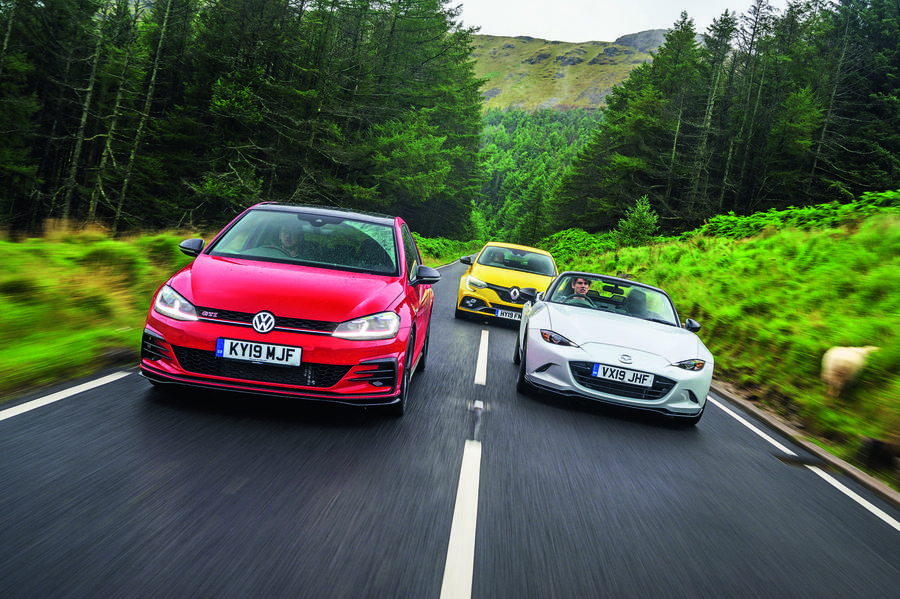
It’s soon obvious that the Mazda stands an excellent chance of making our final three. And if that seems unfair on the basis that it’s the only car here with the conventionally desirable mechanical layout, it would have had a healthy chance of doing so even were this our full-fat ‘senior’ handling showdown – the one with the Ferraris, Porsches and Ariel Atoms. On track, the MX-5’s extra power helps set the tail wide on the way into corners, then simply aim the nose at the apex with the throttle like you’re Moss at the helm of an Aston DB4 GT. Sorry to gush. But look, you have time to think, because the Mazda communicates its intentions so clearly, and yet you needn’t think at all because it’s all so intuitive.
The full-throttle driving style applies as much on the road, too. “Utterly wonderful at its best,” says Saunders. “In a fluent cross-country groove, sweeping up to and around the national limit and using plenty of revs, fitting perfectly inside a B-road lane and giving so much qualitative splendour back without needing to be driven at silly speeds.” Amen.
If one might find the Mazda too compromised as a sole car, it could work sublimely well as part of a two-car garage alongside the hottest wagon yet to be produced by Seat – and yet here the two cars are, side by side and up against one another in the same comparison test.
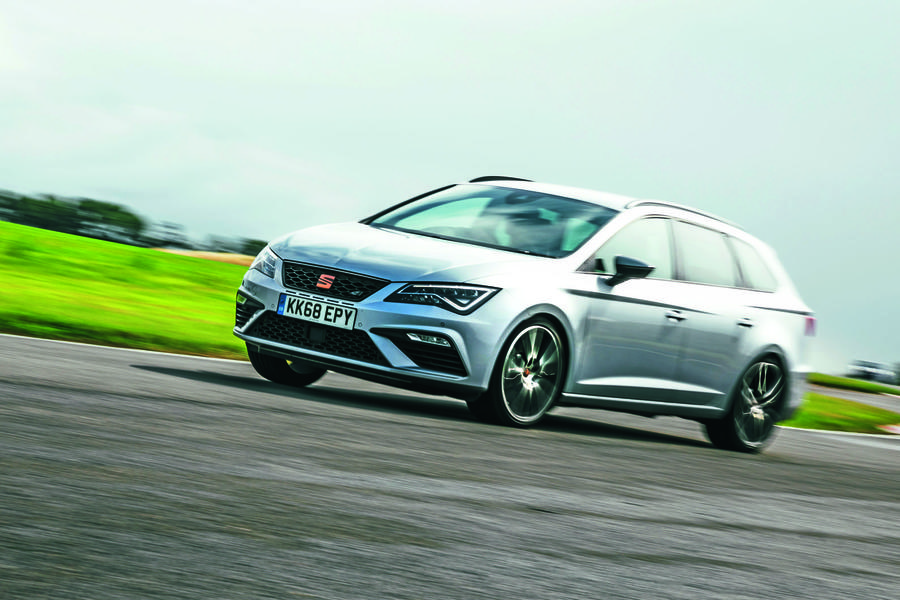
Cupra is now a separate go-faster sub-brand, which makes the Leon Cupra ST something of a brand orphan. There’s nothing pitiable about it, though: the 296bhp 2.0-litre turbo four is transplanted from the Volkswagen Golf R, and while the hatchback variant is front-driven, the estate gets rear driveshafts that help drop its 0-62mph time below five seconds. As Calo notes, it’s a performance level that not long ago was the preserve of wagons with twice the cylinder count and bearing the letters ‘AMG’.
Unsurprisingly, the judges are fond of it. This is an understated car of pretty explosive pace but unexpected delicacy. All are in agreement that it lacks the damper control demanded by its outright speed on the road, but it’ll adopt a rear-biased cornering stance that rewards an aggressive driving style. There is, however, a catch. Saunders, again: “I honestly hadn’t realised this was a £33,000 car when I included it in the line-up. It’s a lot of car, obviously, but that’s stretching the definition of ‘affordable’ a bit far.”
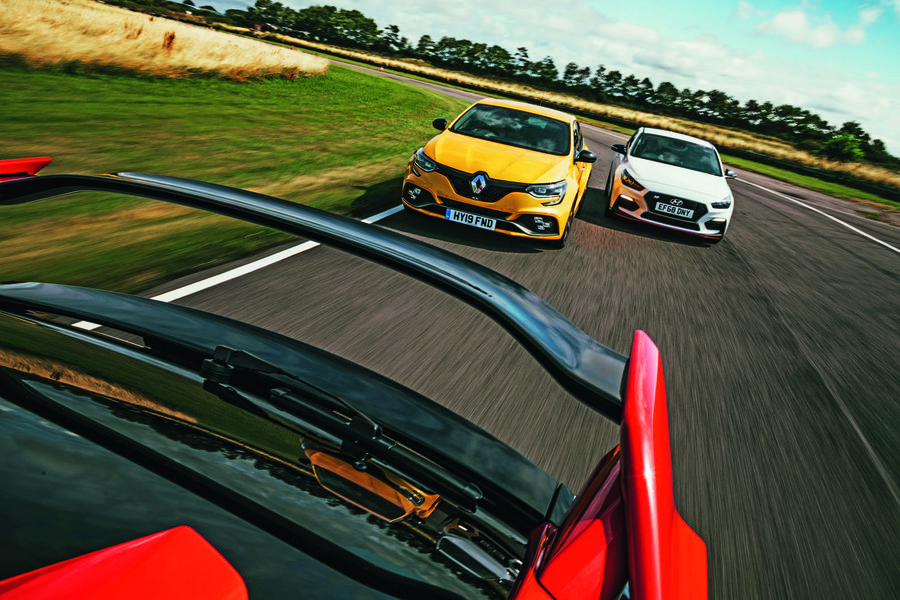
Value for money matters at Junior Handling Day. What nobody could agree on was whether or not the £29,995 slope-roofed Hyundai i30 N Fastback represented such a thing. On the one hand, in the world of the £32,000 Ford Focus ST, sneaking 271bhp, adaptive dampers, a limited-slip differential, an active exhaust, customisable driving modes and a coupé-like silhouette replete with spicy ducktail spoiler in below £30,000 deserves recognition. But it has to hang together from the driver’s seat, doesn’t it?
The truth is that it doesn’t for the Hyundai, not quite, although this new i30 N Fastback remains a sterling effort from a marque so new to the hot hatch game. It has the same hefty steering and nailed-on front axle as the original hatchback, and it gives you the confidence to slip through kinks and corners on the road at tremendous speed. It’s not a car that spins away its power on the exit of tighter bends, either, instead guarding it fiercely with the help of electronics. The trade-off for that seems to be corrupted steering feel, which along with the blunt but powerful engine response, slightly clumsy gearshift and poorly placed pedals, leaves an impression among all judges that although Hyundai is on the right track, the Fastback needs a year or two in hot hatch finishing school.
That’s a school run by the Golf GTI. We know from the old Mk7 Clubsport S that the engineers behind this car can transcend the GTI’s traditionally conservative brief if they really want to, but is that the case with the new TCR?

According to at least three judges, not especially, although it’s still a prodigiously appealing all-round proposition and, as always with real-world performance cars, that matters when it comes to scoring. “It’s weird how one of the oldest cars here can still feel like one of the freshest, both inside and out,” says Davis, who also finds the moderate steering response better suited to road use than that of the rapier Focus ST. An engine tweaked to just shy of 286bhp finally gives the Golf the firepower to compete at the sharp end of the class, along with some vocal character, specifically induction roar. On the road, there’s also no doubt that this particular car’s track-day-spec Michelin Pilot Sport Cup 2 tyres give it an added dose of steering precision and feel – so long as it’s dry.
But this isn’t the usual flawless performance from the car that in 1975 made hot hatches mainstream. Questions are asked of its composure, feedback and interactivity, while on track it suffers from a stage fright similar to that of the Mini. It’s quick to a point and dull thereafter, translating none of its huge front-end grip into tail-happy dynamism, and at times it feels “oddly scrappy”, as one tester puts it.
What, then, of the mighty Honda Civic Type R? For starters, it isn’t new and we will admit the only reason it’s here is to act as a yardstick for the Ford. But it is quite a yardstick and we do love it. “It remains big and ugly and a bit too assured for its own good at times on the road,” says Saunders. “But no other car here has access to this sort of stability, grip, pace, drivability or outright body control on track, which is almost at competition-car level.”

My natural inclination is to quell such enthusiasm, but Saunders is right. The 316bhp Honda is not only the most powerful car in our line-up but it simply has a level of poise beyond anything else, too, and there’s greater mechanical involvement in the gearshift alone than in the entire driving experience of some of the others. “In a field of eight mostly front-drive hatches, it’s as vividly different from the rest as the MX-5,” says Calo. Shall we assume, then, that the Civic Type R is through?
Its closest rival here – the raw yet sophisticated, heart-poundingly quick and ultra-agile Renault Mégane RS 300 Trophy – isn’t. In fact, not one judge placed it in their top three, which is a shock, but taken all together, the French car’s flaws are too much to ignore. Davis, Saunders and Prior all cite ride quality, which, they say, is non-existent on a typical B-road because of the stiffened-up Cup chassis. Davis likens the robust spring rates and restless steering to chugging back a quadruple-espresso: “The hyperactivity is entertaining for a time but it ultimately leaves you feeling a bit rough and broken.” Saunders, though, reckons that in years gone by, you’d have put up with the brutality underfoot for the ‘perfect’ Renault Sport hydraulic steering and a chassis of almost mid-engined poise.
But for me, it isn’t an indefensible car. The security provided by the Recaro buckets and pared-back cabin ambience is second only to the Honda in its intuitive, ‘are you ready to go fast?’ feel. The four-wheel steering can feel clumsily calibrated but equally I’m not sure any car here can match its Swingball apex speed, at least on track. I’m in awe of the agility this chassis can generate and enjoy the levity of its 296bhp 1.8-litre turbo engine. On these cambered, variously dry, damp and outright wet Welsh roads, you need to drive around the Renault’s flaws, anticipating the understeer you sometimes get with an ultra-stiff front axle but allowing the rear to alter your trajectory once the nose is turned in. Davis is absolutely right: it’s exhausting. But it’s also exciting and rewarding, if not to quite the high standards Renault Sport has met in the past.
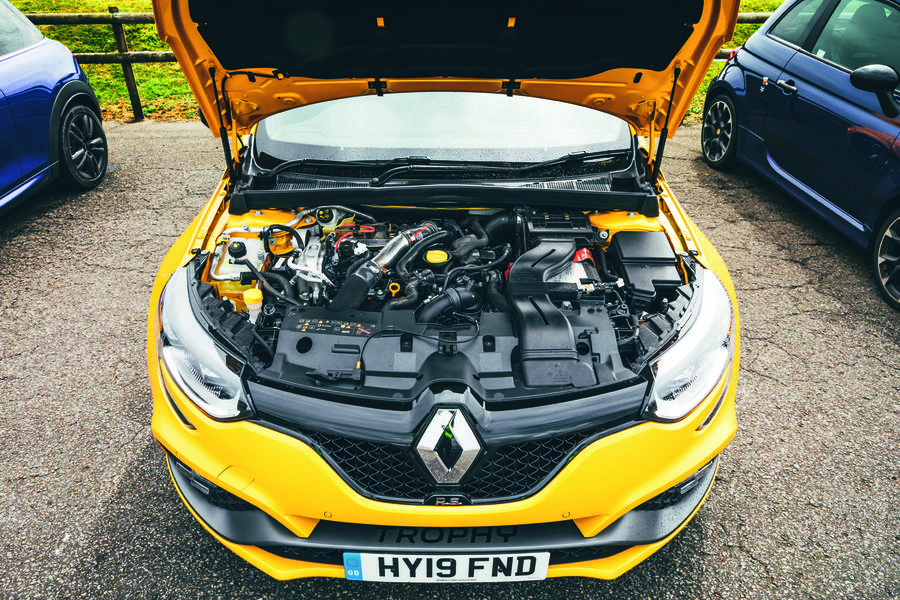
After two days on road and track, the five testers deliver their top three from the confines of the drivers’ briefing room at Llandow. Each one of the judges has the name of either the Honda or the Mazda somewhere on their top-three shortlist. I happen to think the Civic Type R is a more impressive realisation of what a front-driven machine can ultimately be than the MX-5 is for team rear-wheel drive, but they’re both fantastic cars and easily through.
Davis has the Hyundai in third, mainly for its road-going competence and unexpectedly expressive track handling. There is also talk of the Golf GTI TCR, as rounded as a wave-worn pebble and now quick enough to front up to anything in this class. But no, everyone else has the Focus on their final shortlist. With handling genetics recognisable from the Fiesta ST, it’s simply too accomplished to not be part of the final reckoning.
But is it good enough to beat the Honda and Mazda? Saunders adjudicates in part two.
Read more
Britain’s Best Driver’s Car 2018 – part two
Hot hatch face-off: Volkswagen Golf GTI TCR vs main rivals
Source: Autocar
